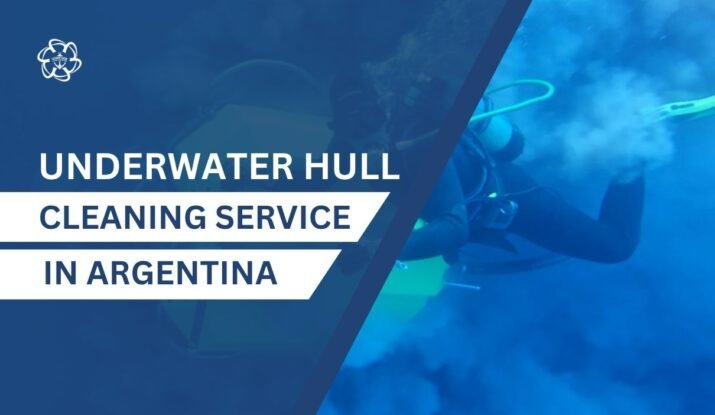Underwater Hull Cleaning in Argentina: A Deep Dive into Cleaner, Faster Marine Operations
If you’re in the maritime industry, you already know the stakes are high. Marine vessels, whether used for trade, tourism, or fishing, require regular maintenance to operate efficiently, and one of the most overlooked yet critical services is underwater hull cleaning.
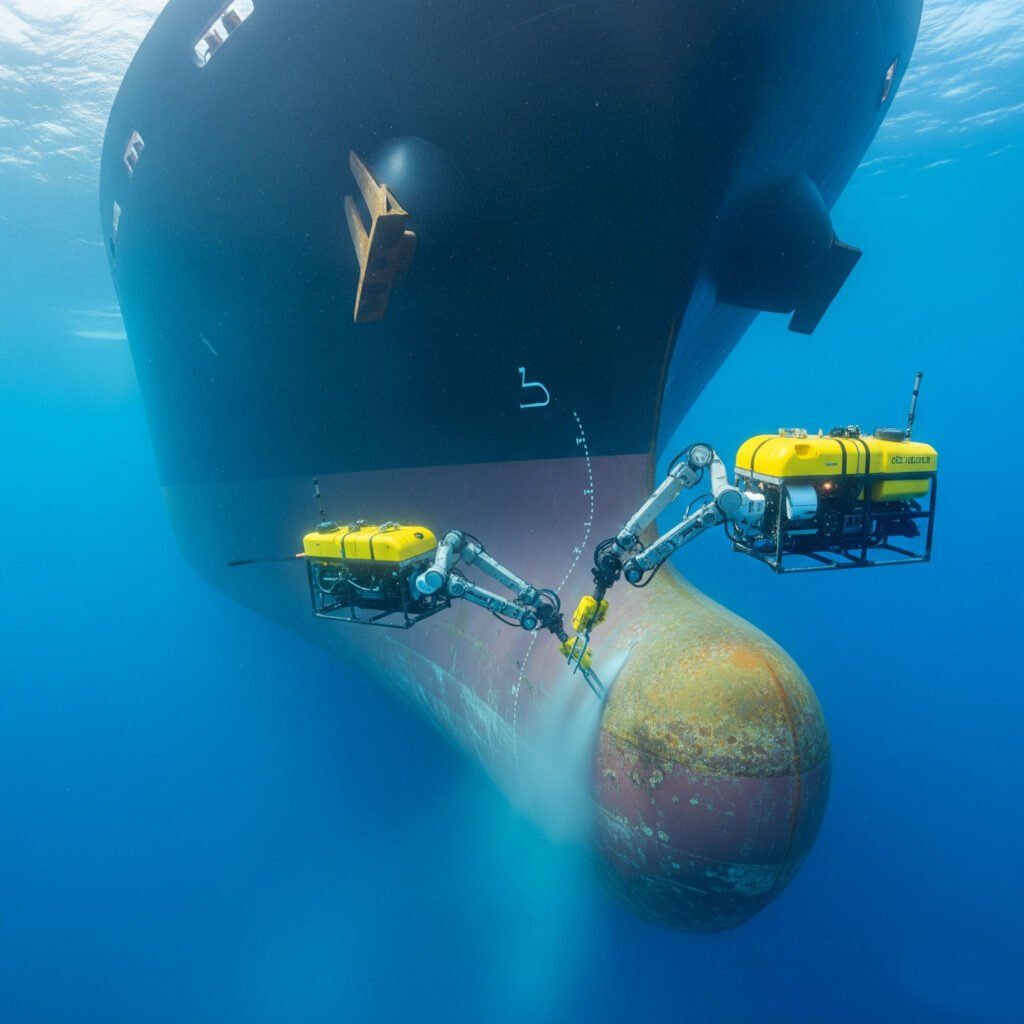
In this in-depth article, you’ll learn how underwater hull cleaning in Argentina is transforming marine operations, improving fuel efficiency, and helping ships comply with environmental regulations. We’ll also walk through current techniques, leading service providers, cost factors, and what makes Argentina a rising hub for hull cleaning.
Companies like CleanShip are at the forefront of providing advanced underwater hull cleaning solutions, showcasing the region’s growing capabilities in sustainable marine maintenance.
Expect to discover:
- What underwater hull cleaning involves
- Why Argentina’s ports are increasingly investing in this service
- The economic and environmental benefits it brings
- Challenges and regulations every ship operator must know
- Future trends and frequently asked questions
Why Underwater Hull Cleaning in Argentina Matters
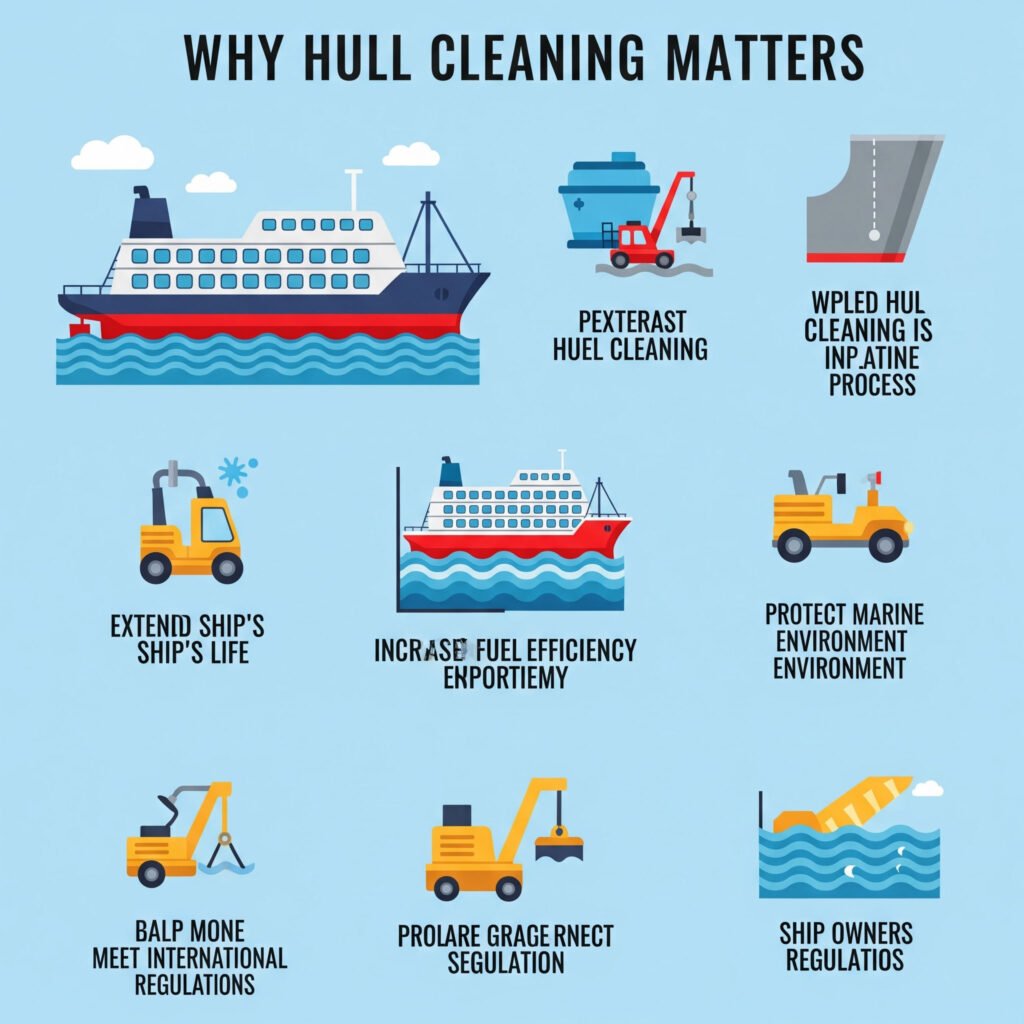
Argentina, with its extensive coastline and thriving ports such as Buenos Aires, Mar del Plata, and Rosario, plays a significant role in international maritime trade. However, one issue silently drains ship performance Hull fouling.
Hull fouling is the accumulation of marine organisms like algae, barnacles, and biofilm on a ship’s hull. Left untreated, it leads to increased fuel consumption, slower speeds, and higher emissions. That’s where underwater hull cleaning comes in—a vital process that ensures vessels operate at peak performance.
What Is Underwater Hull Cleaning Argentina?
Underwater hull cleaning is the process of removing unwanted marine growth from the submerged surfaces of a ship without dry-docking it. This in-situ maintenance approach offers multiple benefits:
- Minimizes downtime
- Enhances fuel efficiency
- Prevents the spread of invasive species
The process may include brushing, high-pressure water cleaning, or the use of underwater robots, depending on the size of the vessel and the extent of fouling.
Why Argentina Needs It?
Argentina’s diverse marine ecosystem accelerates biofouling. Ships operating in the warm, nutrient-rich waters of the South Atlantic Ocean are prone to rapid accumulation of organic material on their hulls.
This makes regular underwater cleaning essential for:
- Fishing fleets operating from Patagonia
- Commercial cargo ships docked in Buenos Aires
- Tourism vessels in Ushuaia and Puerto Madryn
The country’s growing role in international shipping increases the demand for eco-efficient hull maintenance.
Techniques Used for Underwater Hull Cleaning in Argentina
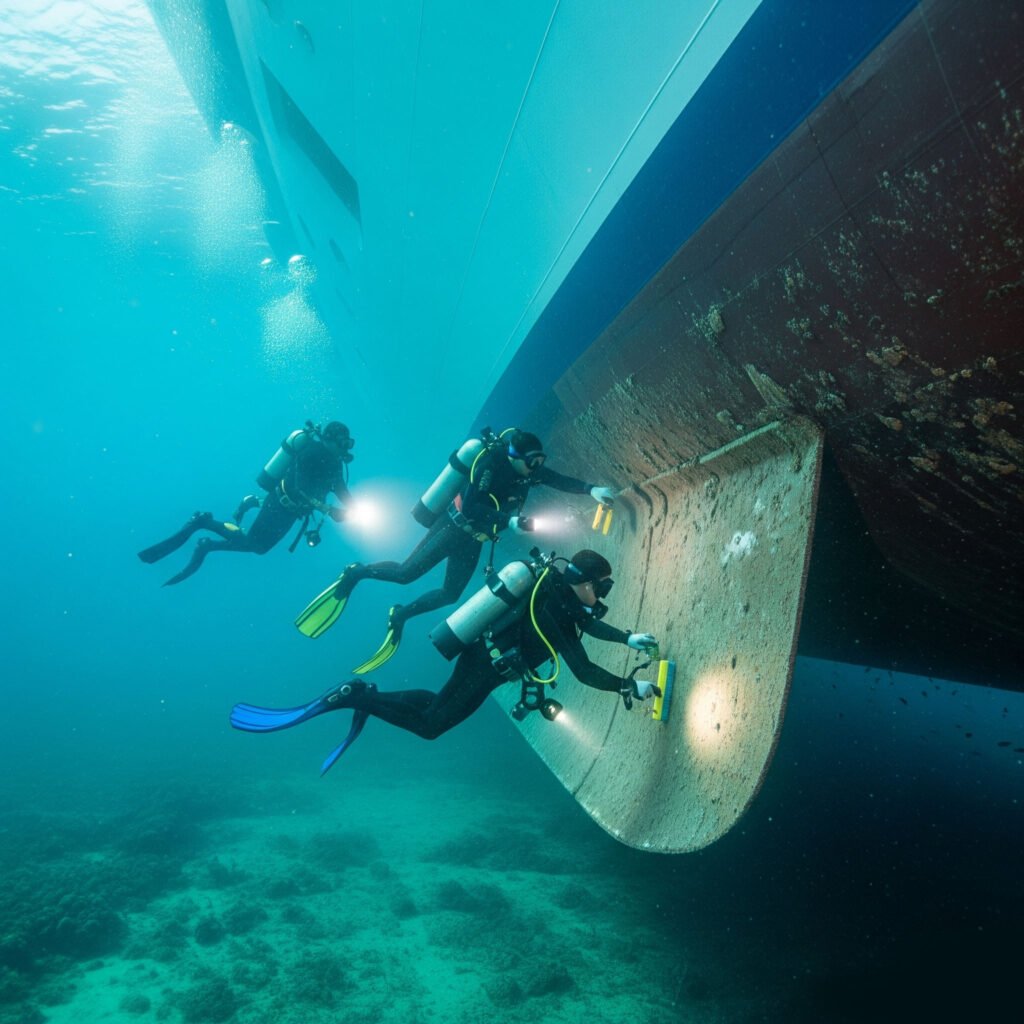
Let’s look at the most common and modern techniques used across Argentina’s ports:
Diver-Assisted Manual Cleaning
Trained divers use scrapers, brushes, or rotating cleaning tools to manually remove fouling. While time-intensive, it is effective for smaller vessels or delicate coatings.
Automated Hull Cleaning Systems
These are robotic machines operated remotely, offering precision cleaning without damaging hull coatings. Argentina’s major ports are slowly adopting such technologies to scale up efficiency.
ROVs (Remotely Operated Vehicles)
These submersible machines use cameras and cleaning arms to remove growth. Ideal for large ships and commercial applications, especially at deeper drafts.
Eco-Friendly Techniques
Modern systems use non-toxic brushes and water filtration to capture debris, preventing contamination of local ecosystems—a key requirement under international marine law.
Benefits of Underwater Hull Cleaning in Argentina
The benefits of keeping a hull clean are multifold:
Improved Fuel Efficiency
Clean hulls reduce drag, requiring less engine power and fuel. Studies show up to a 15-30% reduction in fuel usage post-cleaning.
Environmental Compliance
Argentina aligns with IMO (International Maritime Organization) standards. Clean hulls mean lower emissions and less environmental impact.
Extended Hull Life
Cleaning removes corrosive growth, helping preserve expensive hull coatings and preventing early repairs or repainting.
Less Downtime
Underwater cleaning eliminates the need for dry-docking, saving valuable operational hours.
Key Service Providers in Argentina
Some of the leading service providers operating in Argentina’s ports include:
- Submarine Cleaning Services S.A. (Buenos Aires): Known for diver-led and robotic cleaning systems.
- Patagonia Marine Maintenance (Puerto Madryn): Offers sustainable cleaning services for fishing fleets.
- CleanHull Argentina (Mar del Plata): Focused on container ships and commercial cargo maintenance.
When choosing a service, ship owners should check:
- Certification (IMCA, ADCI)
- Compliance with IMO GloFouling standards
- Experience with the type of vessel you operate
- Environmental safety practices
Regulatory and Operational Challenges
Potential Risks
Incorrect cleaning methods can damage hull coatings or dislodge harmful materials into the marine ecosystem.
Local Regulations
Argentina follows both national environmental policies and the IMO’s anti-fouling system (AFS) Convention, requiring service providers to be licensed and certified.
Diver Safety
Strict regulations govern diver qualifications and equipment standards to ensure safety underwater.
Cost Considerations Underwater Hull Cleaning in Argentina
Hull cleaning costs in Argentina depend on:
- Vessel size and fouling level
- Technique used (manual vs. robotic)
- Port location and water conditions
Dry Docking vs. In-Water Cleaning
Dry docking can cost tens of thousands of dollars and require days of downtime. In contrast, underwater hull cleaning is faster and up to 70% cheaper, depending on vessel type.
Return on Investment
Fuel savings alone often cover the cost of cleaning in just one long voyage, making it a profitable maintenance choice.
Future Trends in Underwater Hull Cleaning in Argentina
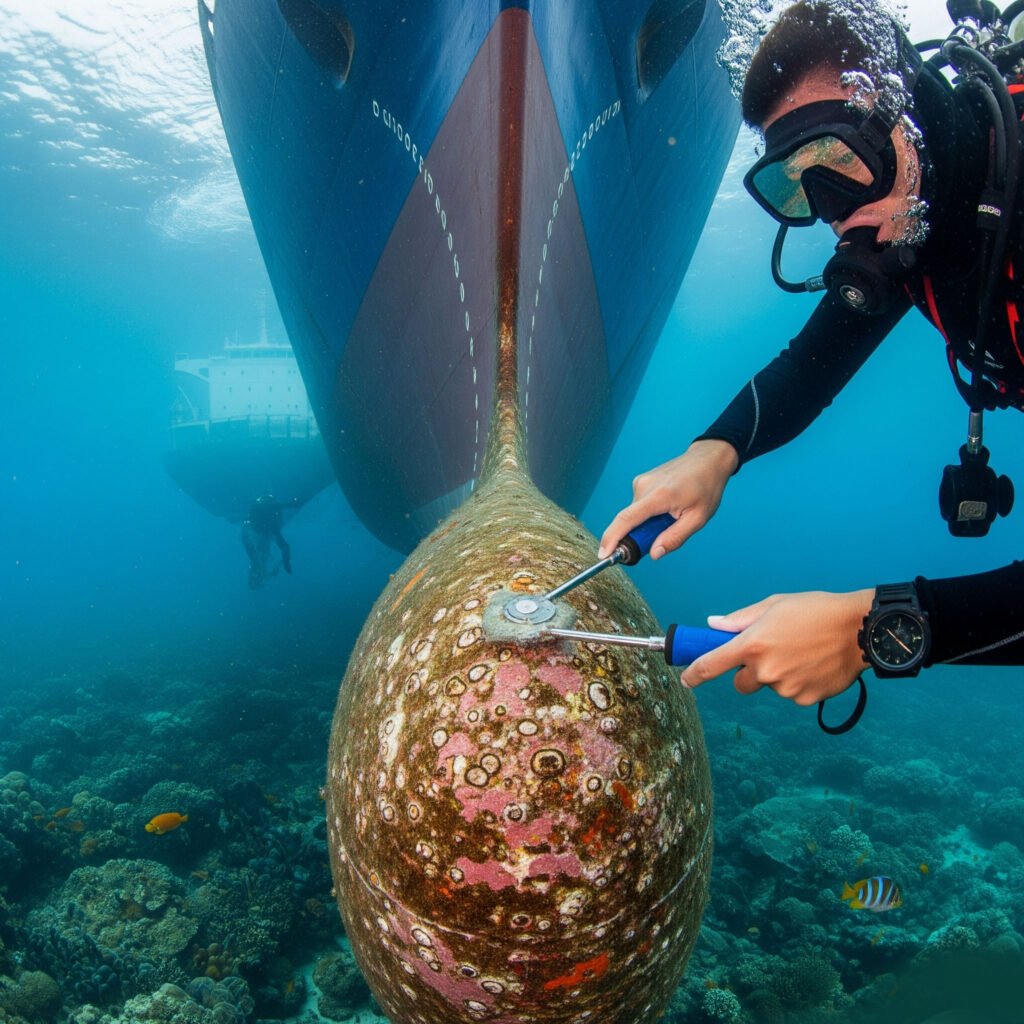
The maritime maintenance industry in Argentina is gearing up for the future:
Robotics and AI
Ports like Buenos Aires are piloting robotic hull cleaners that can operate autonomously and track hull performance data.
Eco-Certified Services
Demand is growing for biodegradable and water-recycling cleaning methods, especially from international shipping companies.
Predictive Maintenance
With AI and IoT sensors, ship operators can now schedule hull cleaning based on data, avoiding unnecessary or late cleaning cycles.
Conclusion
Underwater hull cleaning in Argentina is not just a maintenance task—it’s a strategic investment in vessel performance, environmental responsibility, and long-term cost savings. As Argentina’s ports expand and modernize, the demand for high-quality, eco-conscious hull cleaning services is only set to grow.
If you’re managing a fleet or operating in Argentine waters, now is the time to prioritize underwater hull cleaning—your ship, your budget, and the ocean will thank you.
FAQs
1. How often should a ship’s hull be cleaned in Argentina?
It depends on the water conditions and vessel activity, but generally, ships should have their hulls cleaned every 3 to 6 months.
2. Is underwater hull cleaning legal in all Argentine ports?
Yes, but service providers must comply with national environmental laws and international marine standards like IMO’s AFS Convention.
3. Can hull cleaning be done while the ship is anchored?
Yes, most cleaning operations are done while the vessel is anchored or berthed to avoid delays and dry-docking.
4. Does hull cleaning damage anti-fouling paint?
Not if done correctly. Professional cleaners use techniques that preserve or even extend the life of hull coatings.
5. Is there government support for green marine maintenance in Argentina?
Some local governments and ports provide incentives for using eco-friendly services, especially in heavily trafficked areas like Buenos Aires and Rosario.


